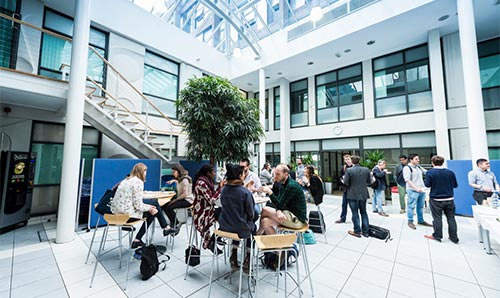Postgraduate research
Our three year structured Doctor of Philosophy (PhD) programme is inspired by the need to conduct rigorous, in-depth research and analysis on the impact and outcomes of contemporary and historical crises.

I wanted to pursue my PhD at a place that is linked to the real world and that invests in in-depth and quality research and there was the HCRI. The HCRI is also particularly unique in its interdisciplinary approach to humanitarianism, peace and conflict, which is an aspect I have come to appreciate even more as I have come in contact with and learnt from its brilliant staff and students.
Rana Khalaf / PhD student
View our programmes, and the support available for our postgraduate researchers.
Programmes
- PhD Humanitarianism and Conflict Response (3 or 6 years)
Finding a supervisor
Bringing together the study of applied medicine and the humanities our structured PhD programme is driven by a desire to inform and support policy and practice, to optimise joint working between partner organisations, and to foster increased understanding and debate within the field of humanitarianism and global health.
As a PhD student at HCRI, you will be surrounded by globally renowned researchers, expert practitioners and policymakers and we welcome applications from students wishing to study in one of the following areas.
The application process should start with the prospective student scrolling through the list below to identify staff whose research interests are similar to their own. The prospective student should then contact these staff directly with a one page summary of their proposed research project and inquire if they would be interested in supervising the project. If the staff member is interested in supervising the project, the prospective student should work with the staff member to develop a 1500 word research proposal that will be the basis for their application to the programme.
To be eligible for internal and external funding, applications for the programme should be submitted online (see how to apply) in the January before the student is due to start their programme of study in September.
My current research projects focus on data and digital practices and violence against health care. I particularly welcome applications related to the following topics:
- Humanitarianism (concepts and practices, humanitarian system, politics of aid, humanitarian response in insecure environments)
- Conflict and health
- Digital humanitarianism
- Conflict and peacebuilding
Supervision interests
- Organized crime and violence in Latin America.
- International Committee of the Red Cross.
- Protection of civilians in armed conflict.
- Politics and practice of international humanitarianism.
- Governance of migration and displacement.
- International humanitarian law.
- International refugee law.
- Colombia
- Mexico
- Myanmar
Available as primary supervisor.
Get in touch with Miriam
Supervision interests
- Operational research to achieve resilience in organisations from different sectors, communities, and societies to deal with complex settings such as disasters
- Disaster planning and management
- Community engagement during disasters
- Systems Thinking
- Soft Systems Methodology
- The Viable System Model
Available as primary supervisor.
Get in touch with Ayham
Supervision interests
- Middle East
- Political violence
- Refugees
- Faith
- Culture
- Humanitarianism
Supervision interests
- Anthropology of Violence and Reconstruction
- Gender, Embodiment and Violence
- Mental Health and Politics of Care in Humanitarian Settings
- Lived Islam in South Asia and the UK
- Healing, Islamic Medicine and Religious Humanitarianism
Supervision interests
- Disasters
- Climate change
- Governance
- Political and cultural geography
- Technologies
- Affects
Get in touch with Nathaniel
Supervision interests
- Humanitarian culture and lived experiences
- Knowledge production in conflict interventions
- Gender and humanitarianism / conflict
- Health worker security in conflict
- Humanitarian narratives/ representations
- Critical analysis of humanitarian data
Available as primary supervisor.
Get in touch with Róisín
Supervision interests
- History of humanitarian action
- Humanitarian medicine
- War and medicine
Get in touch with Bertrand
Supervision interests
- Peace interventions
- Political economy of peace and conflict
- Everyday post-conflict economy formation
- Geographies of peace and conflict
- Civil society peacebuilding
- Humanitarian financing and cash and market-based interventions
Get in touch with Birte
Supervision interests
- History of migration and refugees
- History of humanitarianism
- History of health and medicine
- Genocide studies (especially with focus on the Holocaust)
- Youth studies
Available as secondary supervisor.
Get in touch with Antoine
Supervision interests
- Disaster-development nexus
- Accountability, advocacy and community participation in humanitarian crisis contexts
- Civil society engagements in disaster preparedness and response
- Socio-political dimensions of disasters and health emergencies
- Disaster and humanitarian governance
Available as secondary supervisor.
Supervision interests
- Education and humanitarianism
- Experiences of young people in humanitarian and conflict responses (historical and current cases)
- Community based education programmes (youth and adult) in post-conflict/global health
- Role of empathy/sympathy and humanitarianism
- Community engagement in humanitarian/post-conflict and global health
Available as secondary supervisor.
Supervision interests
- Revolutionary societies and/or post-liberation politics
- Identity, belonging and transnationalism (in particular in relation to refugees)
- Well-being and aspirations
- Global health and related fields
- Conceptualisations behind and practices of humanitarianism
Available as secondary supervisor.
Supervision interests
- Climate change
- Health
- Mobilities
- Disaster
- Medical supply chains
- Environmental sociology
- Health geography
- Medical anthropology
- Creative methods
Available as secondary supervisor.
Supervision interests
- Emergency Care and Ambulance/EMS system development in low-income health settings
- Emergency Health Provider Education through distance learning
- Emergency Humanitarian Assistance
- Global Health more widely, particularly where it relates to health systems and infrastructure
Available as secondary supervisor.
Supervision interests
- Ageing
- Frailty
- Migration
Get in touch with Louise
Supervision interests
- Critical Disaster Studies
- Critical Kashmir Studies
- Borderlands
- Affect
- Decolonisation
- Settler-Colonial Studies
- Anthropology of Conflict and War
- Ethnography
- Creative Research Methods
- South Asia
Available as secondary supervisor.
Get in touch with Omer
Supervision interests
- Mental health and Psychosocial support in humanitarian contexts
- Infectious diseases and NCDs
- Implementation science
- Mixed methods research
- Caring for Humanitarian workers
- Global health (sub-Saharan Africa)
Get in touch with Patience
Supervision interests
- Disaster management
- Multi hazard risk
- Perception of hazards
- Disaster risk education
- Community approaches to disaster risk reduction
- Eco-DRR
- Climate change
Available as secondary supervisor.
Get in touch with Martin
Supervision interests
- Political economy of war and peace
- War to peace transitions
- Illicit economies
- War economies
- Non-state armed group
- Climate and conflict
- Borderlands
- Myanmar
- Southeast Asia
Available as secondary supervisor.
Get in touch with Patrick
Supervision interests
- History of humanitarian aid
Available as secondary supervisor.
Get in touch with Luke
PhD students based in HCRI meet regularly in an informal environment to discuss ongoing work and career development. If you are working on a PhD in a relevant area and would like to connect with this group, please email nathaniel.ogrady@manchester.ac.uk
PhD study at the HCRI
Dr Eleanor Davey and research student Margot Tudor from the Humanitarian and Conflict Response Institute talk about PhD supervision and give you their top tips.
Funding opportunities
Find out about the bursaries, scholarships and studentships available to support postgraduate research.
Read more
Apply
Information about applying for a postgraduate research degree in the School of Arts, Languages and Cultures.
Read more
Our research
Combining expert insights of leading researchers in both applied medicine and humanities, in partnership with NGOs.
Read more

